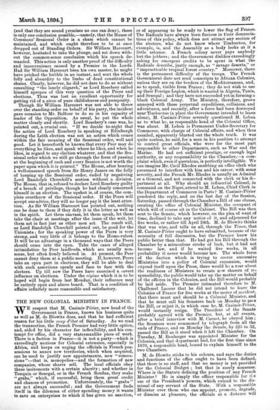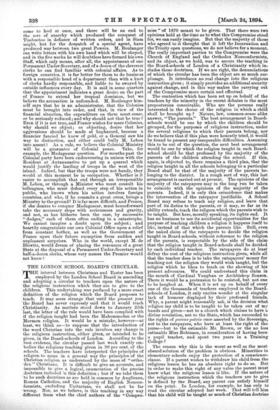THE NEW COLONIAL MINISTRY IN FRANCE.
WE suspect that M. Casimir-Perier, now head of the Government in France, knows his business quite as well as M. de Blowitz does, and that he had sufficient reason for his little coup d'etat of Saturday. As we read the transaction, the French Premier had very little option, and, aided by his character for inflexibility, and his con- tempt for office, did a very statesmanlike piece of work. There is a faction in France—it is not a party—which is exceedingly anxious for Colonial extension, especially in Africa, and keeps on urging the officials in French pos- sessions to annex new territories, which when acquired, can be used to justify new appointments, new "conces- sions "—that is, monopolies—and the formation of new companies, whose shares sell. The local officials obey these incitements with a certain alacrity ; and whether in Tonquin or Senegal, or in the French Soudan, they make " grabs," which, if successful, bring them great credit and chances of promotion. Unfortunately, the " grabs " are nct always successful ; and the Governnient finds itself in the dilemma of either spending money it wants to save on enterprises to which it has given no sanction or of appearing to be ready to lower the flag of France. The Radicals have always been furious in their denuncia- tions of this policy, which does not attract any section of the electors, who do not know where Timbuctoo, for example, is, and the Assembly as a body looks at it a little askance. A French colony never pays anybody but the jobbers ; and the Government dislikes exceedingly asking for emergent credits to be spent in what the Radicals describe, justly enough, as " savage deserts," or " impracticable tropical forest country." Moreover, there is the permanent difficulty of the troops. The French Government dare not send conscripts to African Colonies, unless they are on the borders of the Mediterranean, and, so to speak, visible from France ; they do not wish to use up their Foreign Legion, which is wanted in Algeria, Tunis, and Senegal ; and they have not succeeded yet in forming a black Colonial Army. The Ministry, therefore, grows annoyed with these perpetual expeditions, collisions, and adventures, and recently, after a force had been destroyed near Timbuctoo (a place the Government intended to leave alone), M. Casimir-Perier severely questioned M. Lebon as to what he, as responsible head of the Colonial Office, was about. M. Lebon is Permanent Under-Secretary for Commerce, with charge of Colonial affairs, and when thus assailed, apparently blurted out the whole truth. It was quite useless, he said, for a man in his position to attempt to control great officials, who were for the moat part responsible to other Departments, such as War and the Marine. He had not sufficient prestige, or enough legal authority, or any responsibility to the Chamber, a. com- plaint which, even if querulous, is perfectly intelligible. We can imagine Mr. Cecil Rhodes snubbing an office clerk who presumed to interfere with him and his career, with some severity, and the French Mr. Rhodes is usually an Admiral or a General, and not connected with the clerk or his de- partment at all. Why should an influential Colonel, in command on the Niger, attend to M. Lebon, Chief Clerk in the Department of Commerce in Paris ? M. Casimir-P6rier pondered the reply, and on the last day of the Session, Saturday, passed through the Chamber a Bill of one clause, creating the office of Colonial Minister, the occupant of which will of course sit in the Cabinet. The Bill was then sent to the Senate, which however, on the plea of want of time, declined to take any notice of it, and adjourned for five weeks, or rather till April 24th. M. de Blowitz thinks that was wise, and tells us all, through the Times, that M. Casimir-Perier ought to have submitted, because of the necessity of full discussion, but the Premier knew his public better than that. He had got his Bill through the Chamber by a miraculous stroke of luck, but it had not become law, and if he waited five weeks, in all probability it never would become law. The whole force of the faction which is trying to coerce successive Ministries into a policy of Colonial expansion, would expend itself upon the Press, there would ha a, roar about the readiness of Ministers to create nlw sharers of re- sponsibility, the public would take up the matter on behalf of the officers in the Colonies, and the Bill would probably be laid aside. The Premier intimated therefore to M. Challewel Lacour that he did not intend to leave the Colonies of France for five weeks at the mercy of accident. that there must and should be a Colonial Minister, and that he must call his Senators back on Monday to pats the Bill, or reject it, in which case he, M. Casimir-Pelle; would instantly resign. The President of the Senate probably agreed with the Premier, but, at all events, after a brief interview with M. Carnot, he obeyed him ; the Senators were summoned by telegraph from all the ends of France, and on Monday the Senate, by 225 to 32, passed the Bill as it stood when it left the Chamber. On Tuesday, M. Boulanger was appointed Minister for the Colonies, and that department had, for the first time since 1870, a responsible head, bound to explain himself to the two Chambers.
M. de Blowitz sticks to his colours, and says the duties and functions of the office ought to have been defined, that there is no staff, and that no money is yet provided for the Colonial Budget ; but that is surely nonsense. Where is the Statute defining the position of any French Minister ? He is simply the officer responsible for tl e use of the President's powers, which extend to the dis- missal of any servant of the State. With a responsible Minister over them who can appoint, promote, degrade, or dismiss at pleasure, the officials at a distance will come to heel at once, and there will be an end to the sort- of anarchy which produced the conquest of 'iwbuctoo in defiance of written orders, and in Siam Might, but for the despatch of a special agent, have produced war between two great Powers. M. Boulanger can write letters with his own hand which will be obeyed, and in the five weeks he will doubtless have formed his own Staff, which only means, after all, the appointment of one Permanent Under-Secretary, and of a dozen of the cleverest clerks he can find familiar with colonial affairs. As to foreign countries, it is far better for them to do business with a responsible head of a department than with a knot of clerks hardly responsible, and liable to be swayed by outside influences every day. It is said in some quarters that the appointment indicates a great desire on the part of France to extend her tropical dominion, but we believe the accusation is unfounded. M. Boulanger him- self says that he is an administrator, that the Colonies must be brought into order, and that, in view of the financial situation, the expenditure on them must cease, or be seriously reduced ; and why should not that be true ? Even if it is not true, and France wishes for mere Colonies, why should we object; or objecting, desire that her aggressions should be made at haphazard, because a -financier fancied he knew of gold, or a General saw his way to distinction, and either could bully M. Lebon into assent? As a rule, we believe the Colonial Ministry will be a guarantee of Colonial peace. Take, for example, the Madagascar question. For months past the Colonial party have been endeavouring in unison with the Resident at Antananarivo to get up a quarrel which 'would justify the landing of troops in the west of the island. Indeed, but that the troops were not handy, they would at this moment be in occupation. Whether is it easier to accomplish that end through an irresponsible M. Lebon, or through a Minister who must consult his 'Colleagues, who must defend every step of his action in public, who knows when his action involves foreign -countries, and who, if he commits a great error, brings a Ministry to the ground? It is far more difficult, and France, if she desires to conquer Madagascar, must henceforward take the necessary steps with seriousness and gravity, and not, as has hitherto been the case, by successive " dodges," each of them often ending in a catastrophe. We cannot imagine a doubt upon the subject ; and heartily congratulate our own Colonial Office upon a relief from constant bother, as well as the Government of France upon their future exemption from sudden and "unpleasant surprises. Who in the world, except M. de Blowitz, would dream of placing the resources of a great State at the disposal of a Permanent Under-Secretary and half-a-dozen clerks, whose very names the Premier would not know ?



































 Previous page
Previous page